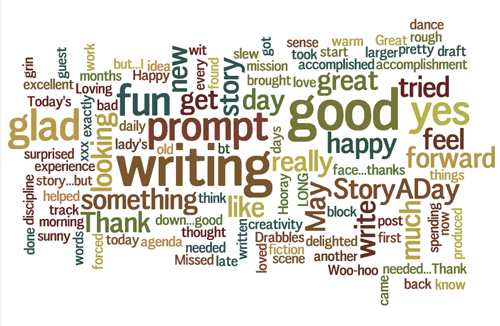OK, so this is Day 5 of the challenge and if you haven’t missed a day yet, the chances are strong that you will. Soon.
So here’s my advice, based on five years of May challenges, a couple of StoryADay September challenges and the writing courses I run.
Let It Go
[1. Cue the sound of my two elementary school aged boys screaming “No! Enough with the Frozen!”]
Let the unwritten stories go and write again tomorrow.
Seriously. This is not so much about turning out 31 complete stories as leaning to turn up every day, even when you feel like a failure. I encourage people never to try to catch up with days they’ve missed. That creates far too much baggage. (You can always keep writing into June if you want your 31 stories!)
Watch And Learn
The other point of a challenge like this is to try to do more than you think you can do, and to watch where it is hardest and where/when it was most fluid. Then, when you go back to your normal writing schedule you will have all these experiences in your tool kit. You’ll know that Saturday is maybe not a day to expect to get much writing done. And you’ll know that 11-midnight is prime time. Or you’ll know that it’s easier to write when you have a plan (or not).
Don’t worry too much. Just keep turning up, keep breathing and keep watching all the ways your inner demon tries to sabotage your writing life. Say ‘Huh, that’s interesting, demon. Nice try, but I’m still turning up again tomorrow”.
If we are going to write for the rest of our lives (and lets face it, we are), all we can do is keep learning!
Adjust Your Rules
Back in 2012 (my third year) I decided I was no longer going to commit to writing on Sundays. I COULD, I just didn’t HAVE to.
Between running the site and having two small children and a husband that I quite like to spend time with, something had to give. Sundays were it, for me.
This is fine. If you decide not to write EVERY day in May that’s cool.
BUT do try to assess your progress on a week to week basis rather than waking up each day and thinking “I wonder if I should write today”. (You should).
Stop now and see how your first five days (which include a weekend) have gone. Decide what you’ll commit to for the next seven days.
Of course, I thoroughly encourage you to write an actual StoryADay unless the thought of it is making you truly miserable. If you’re miserable, change the rules. But keep writing.
So, how’s it going? What are you learning? What tips do you have?














